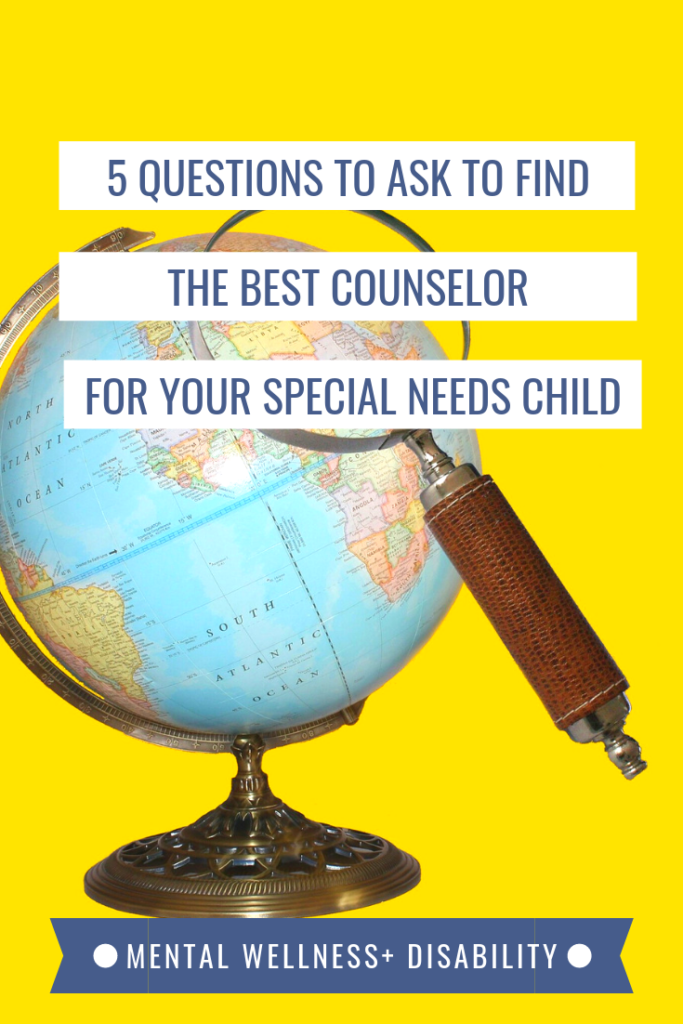I often talk to counseling clients who have kids with Autism or Down syndrome or other disabilities who are looking for a therapist for their child.
These parents are exhausted and frustrated by the lack of therapists who can work with a child with disabilities.
I wish I could give every parent the name of a phenomenal therapist in their area who is just the person they’re looking for. Sadly though, there are not nearly enough counselors who want to work with people with disabilities.
For that reason, instead of giving a referral, I usually share tips for how to find a counselor to meet with clients with special needs, even if there seem to be none around. In addition to looking in all the places I recommend in that post, here are questions you can ask of potential therapists to see if they’ll be a fit for your child.

5 questions to ask to find the best counselor for your special needs child
The most important question you can ask is:
My child has <insert disability here> and is struggling with <insert mental health/life experience here>. Would you to be my child’s therapist?
The reality is that a good therapist who does not have a specific interest or background in helping clients with disabilities is probably going to have some hesitation before saying ‘yes’ to this. At least at the outset, they will most likely say that no, they don’t think they can be your child’s therapist. They’ll want to find someone more qualified to refer you to.
In truth, I would be wary of a therapist who says “SURE!” without having at least a few reservations. It speaks to them not totally understanding the needs of your family member, and what it will take provide them with excellent therapy.
Here’s an example. I’m a Licensed Professional Counselor. As such I could technically agree to work with a client with any mental health disorder. Let’s say for example I get a call from a potential client with an eating disorder. I would never, ever agree to see a client whose primary reason for wanting therapy is to treat an eating disorder, because I:
- have done no specialized training in eating disorder treatment
- don’t read journal articles about eating disorders
- have never even seen a client with an eating disorder.
- Most importantly, I also understand that there are many, many far better qualified and trained therapists here in Cary, NC who have years of experience helping clients overcome eating disorders. I don’t share that experience or passion…
Which is all to say that just because I could doesn’t mean I should.
It’s not that I don’t want that client to be helped; quite the contrary. I want that client to have the most successful therapy possible. I hope they kick the daylights out of their eating disorder. I also realistically see that I am not the best possible guide to help that client realize what work they’ll need to do to overcome their eating disorder. For that reason, I would absolutely insist that they go to a different therapist.
The trouble is that, unlike eating disorder specialists, there are very few therapists who specialize in treating clients with I/DD. It is quite possible that there is no better qualified person in your area.
If that’s the case, explain to the counselor that you understand that your loved one doesn’t fit their typical niche. Ask if it’s ok if you ask a few more questions (and offer to answer some of theirs) to see if it might be a good fit anyways! If they say yes, here are some other questions you can try:
Tell me about your experience with people with <insert your child’s developmental diagnosis here>.
Most graduate programs and internships for counseling and psychology don’t have a heavy focus on disability. It might be covered briefly in classes on lifespan development or neurocognitive function. But few programs have whole classes devoted to the specifics of how to interact with clients with disabilities. Questions like “how do you build rapport with someone who only wants to talk about trains and who avoids eye contact?” aren’t usually tackled!
So, don’t waste your time asking about their training or clinical expertise or research involvement. When it comes to disabilities, they’re unlikely to have much. Instead, just ask about their general experience with the disability. A good counselor will be truthful with you, and might say something like:
In truth, I haven’t ever had a therapy client with Down syndrome. But I tutored a young man with Down syndrome in history when I was in high school. I’m grateful to him for helping me understand that there are a lot of myths about Down syndrome out there. My friendship with him taught me that people with Down syndrome aren’t stupid. They may just learn at a different pace. I also realized that I helped him learn best by being very clear in what I said. It helped when I checked in often to make sure he understood what I meant. So, no, I haven’t counseling a client with Down syndrome. But I do have some understanding of what it takes to help someone with Down syndrome learn new skills.
It’s true that a good therapist will be honest about saying ‘I only know what I know’. It’s also true that a truly exceptional therapist will be willing to gain more knowledge if it benefits their clients. So, another question you can ask is:
Would you be willing to seek out additional learning opportunities/resources/consultation to better understand and treat my loved one?
Keep in mind, you may be doing more of the teaching if the answer to this question is yes. It’s unlikely that many therapists have ever heard of the DM-ID-2 or the Continuing Education courses offered through Commission on Rehabilitation Counselor Certification.
The point is that you’re looking for a therapist who will be willing to do some additional learning and incorporate some new methods if it will be most helpful for your child to succeed in therapy.
Another question that gets at a counselor’s willingness to do something outside their norm to work best with your child is:
I see that you do/offer X. Would you be willing to do Z instead if it were more appropriate for my child?
For instance:
I see that you offer a 50-minute session. Would you be willing to offer a 30-minute session if it were more appropriate for Emily? We often find that after 30 minutes Emily has a tough time attending to any one thing. Meetings just aren’t as productive after half an hour.
When it comes to serving clients with disabilities, therapists must be willing to stretch outside their familiar routines. I believe that this question gets at a counselor’s willingness to do just that.
Another important factor to consider is cost. I recommend that you ask:
How comfortable are you collaborating with other support team members? Do you charge for time spent out of session?
Integrative health care is good for everyone, but it’s essential for people with disabilities. Providers working together ensures that their care is consistent and intentionally delivered. I spend a lot of time liaising with Doctors, OT/PT’s, speech and feeding therapists, school counselors, and so on. Some therapists will charge for their time spent outside of session.
It isn’t right or wrong if they choose to charge. But it is important for you as a prospective client to think about. How much ‘outside of session’ time is your child likely to demand? Knowing this can help you decide if you’re OK with paying for that on top of paying for routine counseling sessions.
I also encourage you to pay attention to the way the therapists speaks. Listen to how they talk about your child and their needs. What you’re trying to ascertain is:
Can they see the person and not the disability?
Listen to the language they use. It’s possible that they may use some outdated or even downright offensive terms. Ignore that, and try to notice instead the spirit of what they’re saying rather than the language they’re using, because that will be the real indicator of any biases they hold about kids with disabilities like your child’s.
I sincerely hope this has been helpful for you. Do you have other questions or tips that have helped you find a great disability counselor? Please share them in the comments!
Also, if you’ve found this to be a helpful resource, please use the buttons below to share with others who might find these questions useful on Facebook or Pinterest!












